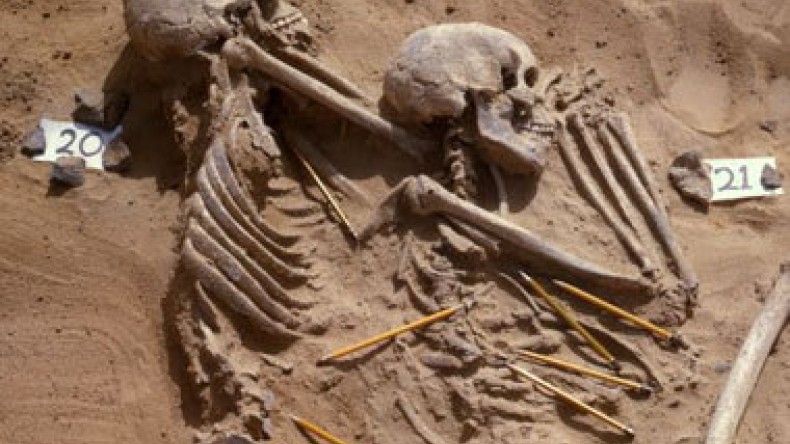
The first race war? Scientists investigating after 13,000-year-old bodies are discovered on the edge of the Sahara
Humans remains of people killed 13,000 years ago in what scientists believe is the oldest identified race war, are today due to go on display at the British Museum in London, the Daily Mail reports.
Two skeletons from a massacre in the Sahara desert in 11,000BC, which killed at least 26 people, will be shown in the new Ancient Egypt gallery, alongside the flint-tipped weapons with which they were killed.
French scientists have been working with the museum to examine dozens of skeletons that were found grouped together in the Jebel Sahaba cemetery - one of the earliest organised burial grounds - on the east bank of the Nile, northern Sudan, in the 1960s.
They believe the remains of the 60 individuals found - around half of which had cut marks on their bones - represent the first communal violence between groups.
Fighting probably broke out because of the environmental disaster of the Ice Age, which caused the attackers and victims to live together in a smaller area, the experts explained.
Renee Friedman, the museum's curator of early Egypt, told The Times that the attackers and victims were hunter-gatherers who usually avoided violence by moving on when a certain area became overcrowded.
But she believed that the cold and dry conditions of the Nile valley around that time caused a 'population crisis', as more people moved to the same area surrounded by desert.
She said: 'Things were probably very tight, so we think that people started picking on one another.'
The museum acquired the remains in 2002 when they were donated by Fred Wendorf, an American archaeologist who excavated the site in the 1960s.
At least 60 individuals were found and examined using modern technology. One body was found with 39 pieces of flint from arrows and other flint-tipped weapons, Dr Friedman said.
As well as the human remains, the display will include flint arrowhead fragments and a healed forearm fracture, which was most likely sustained by a victim who was trying to defend himself during conflict.
Newsfeed
Videos






























